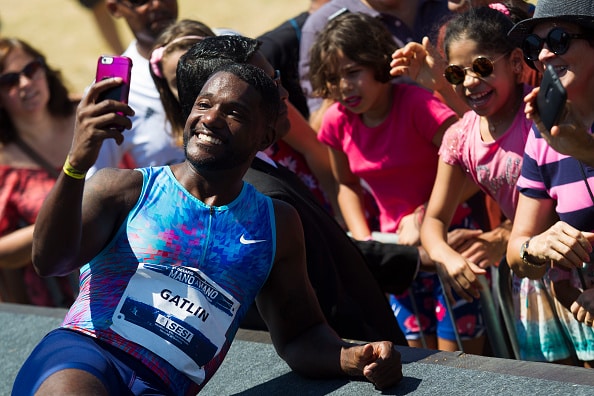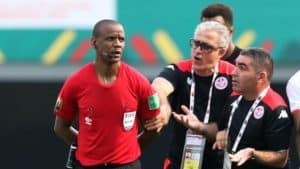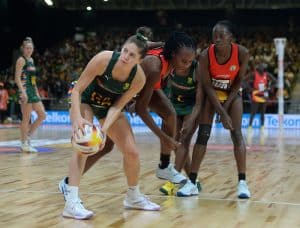Those who believe in the purity of sport won’t be applauding the decision to invite Justin Gatlin to South Africa, writes GARY LEMKE.
Two years before Lance Armstrong confessed to taking performance-enhancing drugs, which led to him having his seven Tour de France titles stripped from him, the American came to South Africa to compete in Cape Town’s 2010 Cycle Tour.
He spent a week doing charity work while being feted wherever he went. This was the world’s most revered cyclist, here in South Africa. Fans could hardly believe their luck. Sure, there had been the rumours about him and drugs, but nothing had been proven. His books, detailing his fight with cancer, were best-sellers and Armstrong was a celebrity. Then, the net closed and in 2012 the truth was out. The ‘greatest’ cyclist was revealed as one of the biggest cheats in sporting history.
How would South Africa react now, were Armstrong come to ride – he can’t as he’s serving a life ban – in the Cape Cycle Tour? Would you take your son or daughter to the event and stand on the side of the road waiting for him to come past, pointing and saying, ‘there goes our hero’. I thought not. Dopers aren’t heroes.
World 100m athletics champion Justin Gatlin is another sporting cheat and he’ll be coming to South Africa in a few weeks to compete in the rarely-run 150m at the Athletix Grand Prix in Pretoria on 8 March.
‘He is the biggest name to compete on South African soil since Michael Johnson in 2001 and is a massive boost to South African athletics,’ governing body ASA said in a statement. One understands its excitement in making the announcement, but surely the country’s own Wayde van Niekerk is a bigger name?
Van Niekerk, memorably, broke Johnson’s two-decade long 400m world record when winning the Olympic gold medal in Rio in 2016 and he’s the first athlete in history to dip under 10 seconds for the 100m, 20 seconds for the 200m and 44 seconds for the 400m. Another example perhaps of us not grasping how big an international superstar Van Niekerk is.
But, back to Gatlin.
Not once, but twice, has he served bans for drugs. In 2001 he was sidelined for two years for testing positive for amphetamines. Naturally, the American protested his innocence, claiming it was the result of medication he’d been taking to treat attention deficit disorder since his childhood. ‘Last time I checked, someone who takes medication for a disorder is not a doper,’ he said.
He returned and at the age of 22 won the 100m Olympic gold medal at the Athens Games in 2004.
In 2006 he again tested positive, this time for steroids. He was banned for eight years but continued to protest his innocence, claiming that a massage therapist had rubbed steroids on his legs and it had got into his system. Under review, his ban was reduced to four years. He should have been done for life there and then.
By 2010 Gatlin was 28 but he returned better than ever as one of the world’s premier sprinters and one of the only legitimate challengers to Usain Bolt’s crown. He picked up bronze in the 2012 Olympics in the 100m and silver in the same event at Rio in 2016. Then, in 2017, he became 100m world champion for a second time – at the age of 35. He bucked every physiological law and was getting faster with age. He put it down to those years spent on the sidelines, so he still had ‘young legs’.
Gatlin will now start his 2018 season as a 36-year-old, the current 100m world champion and Athletics SA’s ‘big drawcard’ to showcase the growth of sprinting in this country. If Akani Simbine is also in that 150m race – Van Niekerk is recovering from a long-term injury – Gatlin will have his work cut out winning and justifying the hype and the appearance fee. None of which has been mentioned, so it begs the question: how much money is a convicted doper being paid to come run in South Africa?
We also asked the question when it came to boxer Floyd Mayweather’s visit in 2014, a convicted woman-beater being invited and given red carpet treatment by the minister of sport.
Sure, the flipside is that the international body deems him eligible to travel and compete where he wants. However, the Gupta family are also free to travel and pillage wherever they want but this doesn’t make them desirable visitors to any South African who has a shred of moral fibre in their body.
And, a last thought. Athletics SA never managed to entice Usain Bolt to run in South Africa – it took the sponsors of the 2018 Sun Met, a horse race to bring him to the country – but instead we are celebrating Justin Gatlin’s appearance. Something wrong in that, for me. Opening our arms to a drugs cheat is not the way to grow the sport in South Africa.
Photo: Bruna Prado/Getty Images





